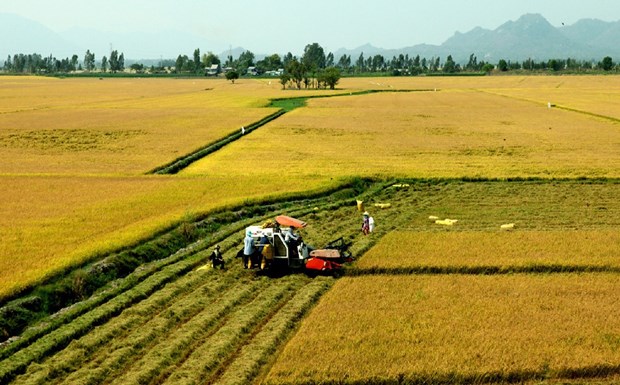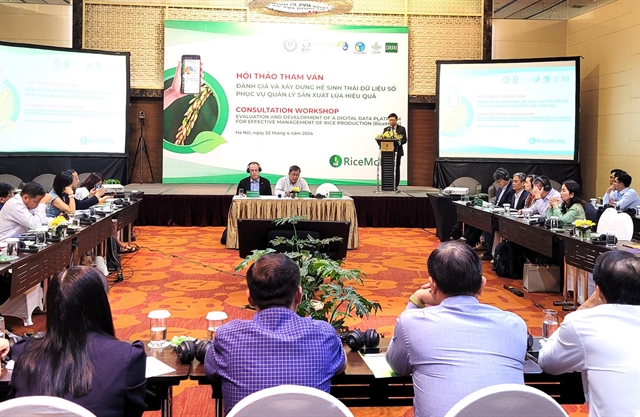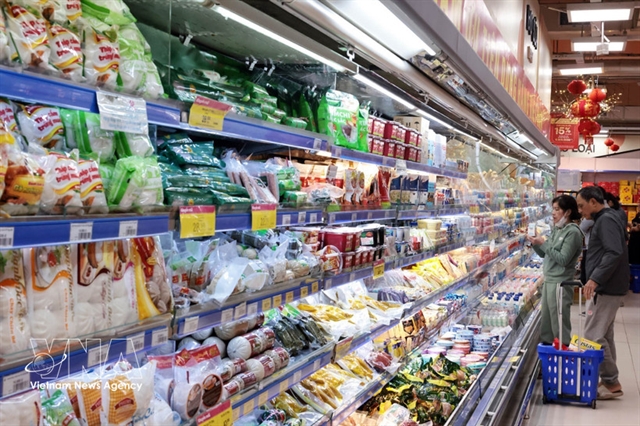 Economy
Economy

 |
| The meeting held by the Ministry of Agriculture in Hà Nội on Monday. — VNA/VNS Photo Tố Như |
By Tố Như
HÀ NỘI — Developed and refined since 2018, the Rice Production Monitoring and Reporting System (RiceMoRe) has yielded positive results, enabling provinces to automatically synthesise data across various management levels, significantly improving rice production reporting and statistics processes. It stores and processes production data, helping calculate greenhouse gas emissions from rice cultivation at the field, farm, cooperative, regional and national levels.
Nguyễn Như Cường, Director of the Department of Cultivation at the Ministry of Agriculture and Rural Development, unveiled the initial successes of the system during the online consultation workshop titled "Assessment and Building of Digital Data Ecosystem to Serve Effective Rice Production Management," held by the Ministry of Agriculture in Hà Nội on Monday.
Following refinement, the system has been rolled out and implemented in nine localities in the Mekong Delta region and one locality in the Red River Delta. RiceMoRe encompasses data storage and processing components, facilitating the computation of greenhouse gas emissions from rice cultivation at various levels.
Consequently, the system holds promise for contributing to greenhouse gas inventory efforts in the rice sector and related national initiatives geared towards green growth and emissions reduction. This includes the Ministry of Agriculture and Rural Development's project on high-quality rice production and low emissions. Cường highlighted RiceMoRe as a precursor to establishing a digital ecosystem for both rice production and agriculture.
Drawing from practical implementation, Trần Ngọc Hiếu from the Plant Protection Station of Cờ Đỏ District of the Cần Thơ City Plant Cultivation, and Plant Protection Branch, shared insights into the system's functionality. He highlighted that the system enables data collection starting from the commune level, relieving district-level officials from manual data entry duties, as they only need to integrate data with the provincial-level database. This application not only saves time but also provides practical and visually accessible data. With updated data readily available in various formats, the system meets the current digitalisation needs of the local agriculture sector, offering quicker access to information.
Nguyễn Quốc Toàn, Director of the Centre for Digital Transformation and Agricultural Statistics, underscored the importance of establishing large-scale data systems and implementing digital applications in production management. He stressed the significance of enhancing digital awareness and skills among farmers, as well as improving the quality of human resources. Toàn mentioned the Ministry of Agriculture and Rural Development's active promotion of digital transformation, particularly in developing a high-quality, high-value open data platform across various agricultural domains.
During discussions, delegates explored the potential of upgrading and applying the RiceMoRe system to monitor greenhouse gas emission reduction indicators in the "Sustainable Development of One Million Hectares of High-Quality and Low-Emission Rice Cultivation, Linked to Green Growth in the Mekong Delta by 2030" project. They also considered integrating it with other systems, tools, and databases to establish a unified, efficient, flexible, and transparent digital data ecosystem for the agriculture sector. Delegates believe that the potential applications of the RiceMoRe system extend beyond its current scope.
Lê Thanh Tùng, Deputy Director of the Department of Cultivation, asserted that this initiative could serve as the cornerstone for establishing a digital data ecosystem in rice production, benefiting rice production and the broader agricultural sector. This effort aligns with the Ministry of Agriculture and Rural Development's key objectives of enhancing production value while ensuring green growth, livelihoods and public health.
Tùng emphasised the significance of having forecast data on seasons and agricultural weather information, stating that a cycle for a RiceMoRe production would serve as the most accurate measurement and calculation tool for various factors that may arise during that cycle. This, in turn, would greatly aid officials at commune, district and provincial levels in providing specific advice and making informed decisions.
The Mekong Delta region is a crucial source of rice production for Việt Nam, accounting for 90 per cent of rice exports. Despite achieving notable milestones in rice production, the majority of farmers in the region still face low incomes, while rice production encounters increasingly adverse conditions due to climate change, rising input costs and heightened consumer demands for product quality. Hence, the establishment of a dataset for rice production in the region is imperative to continually update and provide necessary information for farmers and management agencies. This would enable appropriate guidance, management, and adjustments in production to meet evolving development requirements. — VNS




